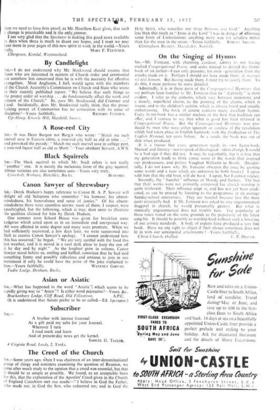On the Singing of Hymns
SIR,—Mr. Forecast, with charming candour, admits to not having studied Congregational Praise, and seeks instead to defend the hymn- book of an earlier—I can only presume, his own—generation from the attacks made on it. Perhaps I should not have made them: de mortals nil nisi bonum. But having made them, I must try to justify them. To do this, I must perforce be more detailed.
Admittedly, it is in those parts of the Congregational Hymnary that are perhaps least familiar to Mr. Forecast that its " depravity " is most evident. I refer to the anthems, which vary between monotony and a treacly. superficial charm, to the pointing of the chants, which is insane, and to the children's section, which is always banal and usually embarrassing. The book of course contains many excellent hymns. Every hymn-hook has a similar nucleus of the best that tradition can offer, and I venture to say that what is good has been retained in Congregational Praise. But the Congregational Hymnary was pro- duced by men who were either ignorant or careless of the revolution which had taken place in English hymnody.. NNith the production of The English Hymnal, ten years before. As a result, the hook was out of date when produced.
-It is a truism that every generation needs its own hymn-hook. Musical and literary—not to speak of theological—ideas change. It would he a bad sign if they did not. It may be regrettable, but it is true that my generation tends to think comic some of the words that inspired our predecessors, and prefers Vaughan Williams to Booth. (Inciden- tally, I do not know why Mr. Forecast obscures the issue by quoting some words and a tune which are unknown to both books.) I agree with him that the old book will die hard. I agree, but I cannot rejoice.
Secondly, the " baneful " influence of Moody and Sankey. 1 he fact that their works were not primarily composed for church worship is quite irrelevant. Their influence crept in, and has not yet been eradi- cated, as can be proved by listening to the programme at an average Sunday-school anniversary. They are baneful because (for the most part) artistically bad. If Mr. Forecast was asked to sing ungrammatical doggerel in church, he would presumably protest. But what is musically ungrammatical does not trouble him. The popularity of these tunes rested on the same grounds as the popularity of the latest song-hit. It should be possible to worship God without such a lowering of our artistic standards. A body of experts have produced a very fine book. Have we any right to object if their choice sometimes does not fit in with our sentimental attachments ?—Yours faithfully.


























 Previous page
Previous page